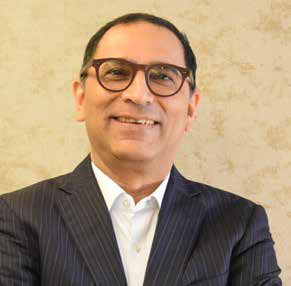“Jab of New Energy”

When the virus first reared its head last year, India Inc. braced itself for the changes that would follow. Zoom calls, working from home, decreased footfalls, diminishing revenues, remote team building and such. Things would get back to normal, they told themselves, even as experts shook their heads sadly at the very notion of going back completely to a pre-Covid world.
As the second wave of the pandemic ravages the country, the experts were proved correct. But it isn’t for nothing that India Inc. are the innovators, entrepreneurs, industry leaders and reputed corporate denizens they are slated to be. Accepting the current scenario, they have taken major business and professional changes in their stride and come up with their own strategies too.
Here, they are telling us the changes that are here to stay-and are likely to come-in the ensuing months-emerging business and professional trends sparked by Covid-19 pandemic; new strategies business organisations incorporating to survive and thrive and how do you see the future of business in India post-pandemic.
Maybe it’s not all a bad thing. As the poem goes: “The old order changeth to make way for the new and God expresses himself in many ways, lest one good thing corrupt the world.” Part of the theatre of action is online, the other is in our mindset. One thing’s clear: the gloves are off even as industry battles with never before demands, determined to overcome
Healthcare solution being addressed through the use of technology

Healthcare has been tested to the limits in the second wave. It is fair to assume that no country will have the capability to deal with such large scale infections and casualties at the same time. However, the scars it will leave behind will permanently alter the topography of healthcare response going forward. To begin with, it would be fair to assume that both central and state governments will bring in greater allocation in their annual budgets and provide for a better infrastructure. This will include indigenous innovation for medical equipment, AI-enabled solutions and vaccines. The sheer inadequacy of the system for large scale calamities as the one we just experienced has been severely exposed.
Healthcare providers have for long believed that only a physical meeting would help find a solution to health issues. The last few weeks have proved that a significant part of the healthcare solution can be virtually dealt with and medication or treatment administered at home. An example would be oxygenation or IV or even emergency care which until now would have never been envisaged to be done at home. So, we will see a major part of the healthcare solution being addressed through the use of technology and democratisation of knowledge.
Thirdly, I expect that NSDC’s efforts and many such skill development initiatives will bear fruit in breaking down the skill requirements for different roles and enabling skill building in many Tier 2 and Tier 3 towns. The risk of concentration of healthcare skills in Tier 1 cities will have to be mitigated. The absence of an integrated eHR and Health Records has also come in for strict scrutiny. The different standards adopted by different players makes it difficult for the customer to have a consistent and easy-to-refer record of their health issues.
Lastly, customers will bring in greater emphasis on prevention and wellness- an area that has so far received scant respect from the citizens. This will include a healthy diet, alternative medicines, fitness focus including emotional well-being. The old adage that Health is Wealth has been fully realised by the public and may prevail in the days to come.
- T HARI, CEO, CallHealth
Fintech and Edutech biggest winners

Fintech along with edutech are the biggest winners of the Covid-19 period in terms of funds raised globally, new products launched and have startups launched. Compliance wise, all have learnt to do e-KYC on video calls, open accounts instantly online and generate virtual credit & debit card numbers. The enabler is virtual, the ID for Aadhaar numbers that safeguard privacy while allowing financial companies to get a credible basis to verify the identities of clients.
Traditional banks, financial distributors, insurance companies and mutual fund companies, credit card companies and NBFCs, are all facing challenges from fintech platforms that are offering greater choice, simpler products and much better pricing. SBIs Yono app is a huge success and some estimates are that as a stand-alone company it would be worth $20 billion in market cap. Small finance banks have emerged stronger as last-mile service providers.
The Jan Dhan accounts opened over the last six plus years along with Aadhaar- based authentication and the mobile phone revolution has led to JAM: the biggest financial initiative in the world that has allowed direct benefit transfers to nearly 500 million potential beneficiaries and to more than 140 million households. Along with JAM, crop insurance, fertiliser subsidies, cooking gas subsidies, MNREGA payments, farmer benefit payments, health insurance and life insurance schemes have been launched for the poorer segments who has no access to such schemes in the past. The Atal Pension scheme is providing a social security product to the unorganised and non-corporate segments for the first time which will transform retirement planning and old age security. Microfinance institutions have again penetrated very deeply thanks to the JAM backbone being created.
Stock market participation has boomed with online and traditional brokerage both offering easy access to millions of WFH Indians. This is a global phenomenon and will create a cohort of stock market investors in India. The number of stock market accounts in terms of trading accounts and dents accounts have gone up by more than 100 lakh new accounts in the past year.
New NBFCs have emerged who are willing to use surrogate, social media-based modelling to provide instant, low ticket loans to under-served and underbanked segments at the bottom of the pyramid. UPI-based payments have boomed and are fast replacing cash, cards and cheques.
Reserve Bank of India has been very much at the forefront in terms of easing compliance norms and broadening the scope of instant payments while bringing the prices down. Bank payments mechanisms like NEFT, IMPS and RTGS have been broad-based and made 24x7. It is a matter of time before Rupay becomes not only an Indian settlement and credit card platform, challenging the business models of Visa and Mastercard. Traditional banks are protecting their turf by launching low cost or no cost digital offerings and acquiring startups that offer these ATMs and credit card/debit card accepting EDC machines have kept growing over the years, but with UPI and QR-based payments becoming universal, it is a matter of a few years before every mobile phone becomes equal to an EDC cum ATM. Already contactless cards issues with embedded chips have made contactless payments at merchants point of sakes possible.
Peer to Peer lending platforms have launched in India, offering better returns to investors and cheaper credit to borrowers. This can become a huge segment as happened in China. Cryptocurrencies have been the best performing asset class globally. Even though the Indian Government is talking of banning crypto currencies, millions of young Indians have invested in these through India based Fintech companies or through crypto exchanges based overseas. This despite the regulatory uncertainty. Even investing in Gold and in Government of India issues bonds has been made easy with electronic mechanisms to buy and sell these.
- AJAY BAGGA, Financial Expert and Analyst
Knowledge has become universal

Tremendous impact There has been a great impact of the pandemic on the education sector. The way we deliver our teaching has totally changed. We have moved from a face to face model to the online model. This was challenging, both for the students as well as the faculty, especially in the month of March 2020. Now, they are finding it much more comfortable, but it cannot be an alternative to face to face interaction in the long run. The pandemic has impacted students a lot. The young generation likes to be on college campuses, it likes to be with friends. Apart from classrooms, there is so much learning that happens on campus through peers and friends. They are missing out on that and that has created a huge impact on the mental health of young students and the youth.
THE SILVER LINING
My father Dr S B Mujumdar said that Covid-19 has been a destroyer as well as a teacher. Coronavirus has taught us introspection. It made us introspect about the future and being satisfied with what God has given us. It has also taught us collaboration and interdependence. The name of our institution Symbiosis, which means the living together of different organisations for the mutual benefit of each other, feels so apt today.
THE NEW NORMAL
When the pandemic hit us in March 2020, it was a reactive response for all of us to tide over the crisis and move on to online education in the interim. In the lockdown, we did so much of capacity building of the teachers to improve the online delivery of education and now it has become a mantra. Now no matter where the student or the teacher is, this kind of delivery is beautiful. I feel we will move towards a blended education format. Even UGC had prescribed about 20% blended education even before the pandemic, and now it is possible to offer even 40%-50%. Through blended education, students can access courses and faculties from institutions around the world. Knowledge has become universal. The internationalisation of education, which was only an elite proposition till now, is now universal.
- DR VIDYA YERAVDEKAR,
Pro Chancellor, Symbiosis International (Deemed University) & Principal Director, Symbiosis
It is a very transformative time

This year has been an oxymoron—as much a year of extreme isolation as it has been one of connection. On the one hand, we had to isolate ourselves socially; on the other, we were connected digitally like never before. The boom of online webinars: the possibilities this has opened up are immense. For instance, I have spoken at two conferences simultaneously- something that would never have been possible in the physical world.
Focus on mental health: However, staying alone as well as the uncertainty has had a deep impact on heart and minds. Hence, the need is to focus on mental health and pulling people out of depression. Physical impact apart, there is a pressing need to build resilience techniques. We need to tap into our inner reservoir of strength; nothing external can manage to do that for us. Social connections help only up to a point; hence, the need for meditation. And then there is the importance of doing sewa. A simple gesture to help each other creates an ecosystem of emotional stability.
Increase in digital learning: In the days to come, the world will continue to function both digitally as well as physically. Work from home is a practice that is here to stay. This will shape the industry and real estate infrastructure. The implications for HR are huge. How on earth do you keep a team together when they never meet each other? How do you create corporate culture? After all, it’s the tiny moments that sew together the cultural fabric of an institution. What you say and do the meetings and get together…none of this is likely to happen now. So, it is a very transformative time.
IMPACT OF COVID-19 ON THE EDUCATION SECTOR:
- Disruption in study progression, graduation, learning trajectories, etc.
- Poor learning quotient of students, due to lack of practical exposure.
- Disruption in assessments and end-of-year examinations.
- As the internet and smartphones are not available to all, the education gap widened between the haves and have nots.
- Low employability quotient of students.
- Poor employment opportunities for graduating students, which has increased the unemployment rate. As per the report of Centre for Monitoring Indian Economy, the imposition of fresh lockdowns has led to an increase in the unemployment rate to over 8% in the first two weeks of April 2021 and has the potential of impacting over 120 million unorganised workers besides hurting the economic recovery process.
- As the stream of international students is drying up, it has impacted revenue flow of higher education institutions.
- Revenue from research and consulting projects have been dried up, due to the lockdown.
- Declining of public/private funding to educational institutions.
- Increased stress in students, as they had to sit in front of screens for a long time with no physical interaction with teachers and other students.
- As per the data compiled by UNICEF on the student population affected by the disruption caused due to Covid-19, more than 1.5 billion students in pre-primary, primary, lower secondary and upper secondary levels of education were affected across 200 countries as of March 2021. In India alone, more than 286 million students have been affected by partial or full school closures.
- The students in government schools, in addition to the missed opportunities for learning, no longer have access to healthy meals during this time and are subject to economic and social stress.
- The pandemic has significantly disrupted the higher education sector as well, which is a critical determinant of a country’s economic future.
- RAJITA BAGGA, President, Sri Sri University
Learnt to be well prepared from an operational standpoint

DISRUPTIONS
As a global manufacturing company operating in remote locations, we faced the brunt in the early days of the pandemic. At the beginning of the pandemic, we had production disruptions but these were soon resolved by the middle of the last year and we have not looked back since.
LESSONS LEARNT
I think the pandemic has taught us many lessons. We have learnt to be well prepared from an operational standpoint. We have learned to be ready for production delays, be agile with logistics and have also strengthened our customer service so we can keep customers informed about any potential disruptions in delivery timelines or service, etc.
THE POSITIVE SIDE
From a personal standpoint, I am grateful to our employees who have become closer working through a crisis and finding solutions and I appreciate the work they have put in during this challenging period and they form the backbone of the company’s smooth operations.
- ATUL VIR, CEO and Founder, Equator Advanced Appliances
Responsible and profitable
Before talking of trends, I wish to highlight four things that would have gone through a long term (if not permanent) reset, consequent to the Covid-19 outbreak:
- The basket reset – what will consumers buy
- Homebody reset – where will consumption happen
- Rationale reset – why will a consumer buy what he/she will buy
- Affordability reset – how much will a consumer spend

Based on consumption pattern reset as stated above, several trends seem to be emerging in businesses. Most prominent of them being the following six:
1 - Protect people – Health and hygiene equipment, accessories, practices are going to be very important in our thoughts and action.
2 - Preserve financial stability – Companies to preserve cash, take measured Capex calls, take business decisions that are responsible and profitable.
3 - Technology a game-changer – Taking advantage of emerging technologies has been a game changer in most businesses. The importance of technology in sourcing, producing, distributing and communicating will be more significant now than ever before.
4 - Adaptive and resilient – Those businesses that will be adaptive and resilient to change will survive and thrive.
5 - Strengthen globalisation – I sincerely hope globalisation gets its due impetus. This is a time for more collaboration and dependence. No one can go it alone.
6 - Strong leadership – This is a time to reimagine and reinvent. Strength and creativity in leadership to make a huge difference.
Now as the country is going through a devastating second wave, several countries have gone through a couple of waves, Covid-19 does not look to be an event but the first of a series. Covid-19 may as well be ‘a herd of stampeding elephants’, as Tom Friedman puts it succinctly. Therefore, businesses will have to deal with muted pricing power over a long period of time. Agriculture to remain the silver lining, rural, Tier 3/4 towns to lead bounce back.
- RAJIV MITRA, CEO, Prabhat Dairy, Groupe Lactalis
Being “Phyjital” is the new normal

EVERY CALAMITY CREATES NEW OPPORTUNITIES
The 20th century had some historic moments which changed the way people lived and transacted business for example world wars, Gulf War etc. The 21st century is having one such catastrophe which all of us are going through–coronavirus. We thought things are getting better but on the contrary, second wave seems more impactful and devastating than the first wave. It has created panic amongst all sectors. Barring improving environment, it has no positive takeaways, it has created a new normal trend of being Phyjital (Physical+Digital). Virtualisation, Sanitisation and Distancing will be now new habits. Security became a prevalent practise after 9/11. Similarly, virtualisation will now be acceptable in every sector. Work-from-home was a popular term of IT professionals - now every sector has successfully practised it. Every calamity also creates new opportunities.
SKILL UPGRADE IS THE NEW MANTRA
With work-from-home, many companies have shed office space and revisited Pay Packages since office conveyance is not there. Connecting with customers is now digital. Marketing strategies are more online now. With cost-cutting happening in all sectors, luxuries are definitely at stake. People will meet more online than attending parties, corporate events in luxury resorts etc. e-Learning, e-Mentoring, e-Certification will find many new takers as many will lose jobs globally. Skill upgrade (especially with digitisation) is new mantra.
THEORY OF GLOBALISATION WILL BE REVISITED
Post lockdown, the new normal will see a changed world. Theory of globalisation will be revisited. Many families find trust and faith now with nearby grocery shops and won’t do e-commerce any more. Every sector will get affected due to the change of spending habits. Many luxuries won’t appear on the shopping list. The healthcare sector will see sunrise growth. Like ventilators, many medical devices will be locally made at a lower cost and many Indian engineering companies have a big opportunity in the medical devices sector. More hospitals, beds, wards in India means more demand. At the moment, most of them are imported. China dependence of many sectors (Automobile, Electronics, Mobile Phones etc.) is expected to reduce and India should gain from it. This is a classical theory which needs to be proven with a business case, which is where the Government needs to push friendlier ‘Make in India’ programme and giving preferential treatment to such investors.
- DR DEEPAK SHIKARPUR, Director, Kinetic Communications
Shifting consumer trends post Covid-19

India is deeply impacted by the Covid-19 pandemic that started in March 2020 and the country is facing the second wave currently. This has brought two important areas to the forefront, namely, the health infrastructure of the country and disruption by ongoing lockdowns impacting the economy. The evergreen sector of the economy that is the FMCG sector which has two subcategories: Essential and Non-Essential have also taken a big hit with the unexpected change in the consumption patterns. This sector that accounts for 19% in Food and Beverages, 50% in household personal care and 31% in the healthcare contribute to one-fourth of the country’s economy. The demand-supply ratio has been highly disrupted. In the first phase of the pandemic, the essential sector category sales declined by 26% and by 47% in the non-essential category sector, in comparison to 2019. A look at the consumption patterns in FMCG suggests that the pandemic restricted the movement of people, impacted factory operations, disrupted logistics and closure of many non-essential products and food outlets nationally. On the other hand, this triggered panic buying for staples leading to stockouts in certain categories.
On the revival front, general and modern trade have shown some recovery post the first wave of the pandemic but clearly, the focus shifted to traditional kirana stores for the FMCG sector and increase in online and doorstep delivery purchase patterns with clear prioritisation on essential goods and lower on non-essential and discretionary category.
The pandemic has reduced customers’ buying power as well as customers’ purchase index is at an all-time low. This is the time for non-essential brands to be relevant in consumers’ mind through their offering. Many brands are pivoting to the new norms of customer expectations, touching on the aspect of healthcare in the personal care product category. Companies are in “now” phase trying to understand the challenges upfront, accessing the initial impact and actions to respond to the pandemic crisis. In the next phase, the companies should streamline operations to mitigate the ongoing challenge and seek fitting opportunities from the crisis. In the “beyond” phase, companies will have to look at a strategic transformation and prepare themselves for similar future disruptions.
- DR APOORVA PALKAR,
Director-Innovation, Incubation & Linkages, Savitribai Phule Pune University (formerly Pune University)
Seed stage investment grew in value and volume

Posiview Capital Advisors is a boutique investment bank based out of Pune focusing on fund raising for startups and the real estate sector. The Covid-19 pandemic has impacted nearly all the industries across the board with only a few exceptions and the investment banking sector was no different.
THE LINES BETWEEN PERSONAL AND PROFESSIONAL SPACES WERE BLURRED
Wearing two hats-a mother of two and a co-founder at a consulting firm, my immediate challenge was to manage both worlds efficiently. Until the pandemic, the two worlds were co-existing mostly independent of each other. But come the lockdown with the work-from-home, online-schooling and the lack of household help culture, suddenly, both worlds were not just overlapping but fighting for attention at the same time. This gave rise to working at any time in the day and night as per the time availability-luckily, employees, clients and associates were all in the same boat and hence, understanding and supportive. Being an investment banker, even before the pandemic, our calls with VC funds and prospective investors would be held online. However, at the customer end, we would have physical meetings for understanding the models, preparing collateral, collating data etc. But now we see that all interactions happen online and remotely and though there was a learning curve involved, now, the flow of information happens smoothly and in a reasonable time.
FLOW OF FUNDS NOT IMPACTED
It has now given us the confidence to take up outstation assignments and run them efficiently without any physical travel. Many people were apprehensive that the pandemic will impact the flow of funds to startups but those worries were misplaced. India continued to be placed in fourth position globally in the startup funding leaderboard. Seed stage investment grew in terms of both value and volume of deals. Technology has proved to be a disruptor and we at Posiview, believe that startups that are able to solve relevant problems using technology as a differentiator, irrespective of the sector they operate in, will continue to attract investment. Fintech, Deep-Tech, SaaS and Edtech sectors are likely to garner investor interest in the next 2-3 years.
- PRAJAKTA SHETYE DEO, Founder and Partner, Posiview Capital Advisors, Pune
Packed brunches, decreased footfalls, the new normal

Gone are the days of the magnificent “Sunday Brunches” just one among the unending list of Food and Beverage offerings. What we have come up with as an alternative is Packed Brunch by Marriott on Wheels. Hospitality, without a doubt, is one of the worst affected sectors due to this pandemic. Be it social gatherings or walk-in guests, every single aspect of the hotel industry stands affected. It breaks my heart to not be able to put up the scrumptious buffets on a regular basis unless called for.
IMMUNITY BOOSTING FOODS AND CUSTOMISED MEALS
We have curated customised meals which now is the need of the hour. Immunity boosting foods, ready-to-eat meals are in huge demand. In the current scenario, memorable and safe dine-in experiences are the foremost factors that customers look out for. We strongly abide by the “Commitment to Clean” safety protocols.
KEEPING OUR HEADS HIGH, UPGRADING SKILLS
I remember last year during the lockdown, I was making home videos and creating recipes at home. At the end of the day, you can’t take away the art of cooking or the passion to create scrumptious worthies from a chef, and that is a comfort. I have had the opportunity to complete a lot of training along with my team and keep their morale high by engaging them in motivational games, quizzes etc. to ensure as a leader, I look after their mental and emotional health.
The new normal is scary with the deceased footfalls. A few months ago things had just started getting back to normal. But then the numbers of the Covid-19 affected started rising again, so Maharashtra had to go in for extended curfews and shut down eateries. Our focus right now is to ensure we deliver delightful culinary experiences to our inhouse guests as well as those who wish to enjoy the same from the safety of their homes.
We are focused on revival and are also equipped with more multi-skilled team members who are committed to continually serve the guests. We are the land of ‘Athiti Devi Bhava’ and staying strong through these tough times until a better tomorrow, is our duty and outcall.
- CHEF MERAJUDDIN ANSARI, Executive Chef, Four Points By Sheraton, Navi Mumbai
Everyone embraced the new normal

Covid-19 is one of the most catastrophic happenings, which probably we might come to see during our lives. Initially, one did not know how to resist/whether to resist but later, as goes the adage, ‘necessity is the mother of invention’ and we learnt the revised ways to overcome the pandemic blues. So what are the emerging trends?
Digital transformation: Not to move up the value chain but just to be relevant and not being outdated from the business, entities whether from the retail / healthcare / hospitality / education needed to embrace digital technology, invest in it and make it their business order. No comfort to operate “business as usual”. The application of Robotics (BOT) has gained immense usage for business transactions.
Growth of online education systems: Not just businesses but education, as a concept, embarked on online platforms using IT tools with pre-recorded videos and animations creating a paradigm shift. Edtech business started thriving with companies like Byju’s and Vedantu commanding premium valuations.
Work from home: In Pre-Covid days, traditional sector entities never fathomed that WFH methodologies have to be adopted as a means of work to achieve business targets, it being basically reserved for the Information Technology sector. Not being able to physically interact meant that virtual mode became the new order with higher dependence on upgraded telecom infrastructure. Entities operating in upgrades of the telecom infrastructure have seen their top lines going northwards. WFH has amended the business plans of many service entities who have given up on rental spaces thereby creating ripples in the real estate industry. Using digital modes to communicate business has thrown the travel industry into a complete disarray. Reconfiguration of procurement/supply chain strategies: The traditional procurement methods gave way to an online basis of controlling purchases with a much higher dependence on IT tools tracking the origin of supply/shipment details and expected deliverance details being shared in advance with the customers. E-commerce became a necessity and each and every item of purchase got enabled creating a disruption to traditional malls and hypermarkets. Troubled financial sector: Covid-19 has had a massive regressive impact on the financial segment wherein corporates are grappling to trace out where the cash required for running the business is going to be available from. The demand for goods has evaporated, suppliers do not pay on time and the working capital cycle is badly affected. To top it all, banks are not keen to fund corporates even whilst the Reserve Bank of India is easing out norms for lending. They actually choose to deploy the funds back with the RBI instead of lending to the needy requirements as profits of entities start dipping and cash becomes scarce. Even under such a scenario, banks are provisioning for incremental bad loans in their balance sheet. Equity money has hit a roadblock for lack of conviction. Overall pessimism prevails—everyone embraced changed methods not just for growth but mere survival in these challenging days.
- KANGEYAM GANESH, Managing Partner, Kartrii Solutions
Technology to play a leading role

‘Apocalypse Now’ was a film that was made in 1979 capturing the horrors of the war. There might well be a sequel to play out the disruptions and difficulties faced by the global and local businesses with the advent of the Covid-19 pandemic. While tech, telecom and shipping are in calmer waters, unemployment in India is now at a historic high and smaller and family-owned business are closing down. There are drastic changes in consumer behaviour and technology is now set to play a more leading role.
IMPORTANT CHANGES WE WILL SEE IN BUSINESSES ACROSS THE WORLD:
Technology and digital evolution are now accelerating and companies will now increasingly look to adapt to big tech. There will be an emergence of new digital platforms and adaptation and agility are going to be the key to survival. Retail, healthcare and hospitality sectors will have to undergo digital transformation in a big way. Globalisation was an important strategic tool. Companies and corporates are now increasingly looking at shortening their supply chains and are procuring locally to avoid sudden disturbances. Entrepreneurship will come out at the top due to losses in jobs and the next Apple, Intel might be just around the corner. Remote working will replace the traditional methods of block office space and a major percentage of the workforce will work from home in the future. There will be a spike in demand for work from home products and other supporting and related technology. The speed of execution and creative problem-solving skills will be in a high demand and companies will be willing to pay a premium for them.
- UDAYENDU LAHIRI, UD Design, Creative Director
Taught us the need to learn and to thrive

While the Covid-19 crisis forced many consumers to change their behaviours, these also impacted their beliefs in the running of their everyday activities, be it grocery shopping or fitness and even socialising. My professional experiences rest extensively within the financial services, the IT sector and fintech companies which have become the flag bearers of change in adapting to the new norms of an ever-growing virtual world.
WORK-LIFE EVOLUTION
The pandemic taught us to cope and adapt to the emerging trends that have become integral to our lives. Working from home, minimum travelling, corporate cascades becoming webinars and most of all, acceptance of the blurring lines between personal and professional life have become the new norm. This indicates that we are now able to see beyond the boundaries and touch the empathy quotient immediately, as we view each other as more of a humane self. Formal tops and shirts with dress down bottoms are the trends to stay as we look into the future.
TECH DRIVES TO BUSINESS
The pace of change is directly proportional to technology evolvement and can be fulfilled using newer and faster technology backed with faster methods of delivering those changes. On both fronts, the key ‘cheat sheet’ that works is to harbour the skill sets of your team, keep investing in their training and increasing the overall team productivity of the team. This in turn helps to inspire trust from employees, keeping the operation costs low as well as keeping the company abreast of trends with the latest changes. Accelerating digital transformation, staying relevant in changing times and embracing innovation to create breakthrough values, are some of my top priorities for the business.
ALL THAT IS DIGITAL AND VIRTUAL
As consumers are becoming digital savvy, the expectations have also skewed in the favour of more contactless services, a seamless digital journey and cyber secured customer interfaces. These three areas remain our constant focus whilst keeping our customers’ needs at the heart of all our strategies. I strongly believe that the only mantra to survive is to follow customer behaviour, design services to fit their needs and keep the service after sales palpable while also optimising on operational costs. This has been at the core and is the survival kit for my sector. As virtual working is slated to become the norm of life, the post-pandemic world has definitely taught us the need to learn and to thrive.
- ANKITA GHOSH, Director, Infrastructure Networking, Fiserv, Inc.
AR-enabled shopping and contactless payments are in

The onset of Covid-19 has impacted just about every aspect of the industries in an unimaginable and unprecedented way. The challenges continue to escalate as India reports the emergence of the second and third waves of infection. This has disrupted businesses, changed consumer behaviour, attitudes toward office work, and even some views about our society itself. To keep up with this, we have made a few amends. As we are an omnichannel platform we continue to work closely with our marketplace and delivery partners to provide seamless services to our partner brands. We believe our strength lies in providing technologically superior products and operational support to our brands.
Trends such as using Augmented Reality instore and online to help shoppers make better, more confident purchase decisions is the next big thing. Augmented reality not only helps the customer get a feel of the product but it also helps online retailers reduce their cost on returns drastically by providing an engaging try-before-you-buy digital experience. Secondly, contactless payment has already become a part of our new normal, it is a secure payment method using a debit or credit card, smartcard or another payment device by using RFID technology and near-field communication. Share cart or payment links directly to your phone using QR codes or WhatsApp to have a contactless, safe and fast checkout experience makes a great difference. Omnichannel providers now offer their merchants a secure omnichannel payment processing platform with the flexibility to support their in-store, online and mobile needs. This empowers them with the scalability to power sales today and in the future. Also, the video shopping at home feature is coming in handy at the boutique and designer fashion stores. Additionally, video content has gained immense traction as the most preferred form of entertainment owing to the ongoing pandemic and lockdowns. Shoppable videos or in-video commerce is quickly becoming the simplest way for consumers to shop and for brands to streamline sales.
- FAROOQ ADAM, Co-Founder, Fynd
With challenges come opportunities

The Covid-19 outbreak has brought companies into uncharted waters, pressing them to re-evaluate how they oversee and operate their business. KARAM has succeeded in timely leveraging the opportunity in disguise by empowering the work-from-home culture and digital transformation. This has enriched senior management productivity at large. We have been making products that meet the needs of the post-Covid world. Adding a Covid-19 new product range to our portfolio, the company is striking a balance between the market’s demand and supply while continuing to enhance the profitability of the business.
With the global pandemic affecting all facets of life, likewise, the safety industry has also witnessed a striking paradigm shift. Upending the daily lives of employees and workers across industries, the pandemic has introduced us to innumerable challenges. But with challenges come opportunities—we, leveraged upon the opportunity to continue prospering by embracing the digital transformation in our work culture. From broad scale move to remote working to training executives with digital tools and technologies, we ensured an unbroken and productive workflow.
INTRODUCING COVID-19 SPECIFIC PRODUCT LINE
As regards strategy, we, strongly believe that our employees are our fuel for flourishing. Therefore, assuring the complete health and safety of our employees and workers and keeping them motivated and inspired becomes our utmost priority. We effectively implemented remote working and Covid-19 safety protocols at the workplace to keep us moving. We introduced our latest product-line to combat Covid-19 scenarios which include ISI certified masks, protective goggles, medical face shields, full-body PPEs; we are endeavouring to ensure the safety of our frontline workers and end consumers.
LEARNING AND LIVING
The coronavirus and the following economic turmoil have shaken businesses to the core. When the dust settles, we, at KARAM, braved the pandemic and adjusted fruitfully to the ‘new normal’. The emergence and effective application of new technological opportunities, immediate adherence to shifting consumer needs and timely implementation of safety guidelines for protecting and enriching workforce productivity were some of the emerging trends that resulted in scoring us the competitive edge in the market.
- HEMANT SAPRA, President – Global Marketing, KARAM Industries
Virtual platforms are doing wonders for MSMEs

Business performances have changed drastically across the sector and so are the business processes. There are tremendous changes in the business pattern as well. As I am into consulting, at one end there is no fund to allocate any non-operation services. But on the other hand, optimising business resources and identifying and eliminating hidden costs are necessary. The most hit industry sector is MSME. Specialised services like how to support the business by performance improvement and digital transformation are gaining attention.
Immediate attention should be provided towards upward or downward integration of products or diversification of the existing product basket. In this scenario, people are looking for guidance and handholding to identify the changes and success strategy from us. As MSME transformation specialists, many companies who are operating their business in traditional ways are approaching to identify and implement suitable automation and digital transformation in their business.
In our sector, while most people are interested to have a physical visit and personal interaction for all sorts of communication are now adopting challengthe virtual platform. People are becoming tech-savvy. The adoption of video meetings, online coaching and virtual communication on email and phone are a regular part of our business process.
With these changes, the economy of scale in the consulting and coaching sector comes a relief. As we don’t need to travel a lot, cost-saving of transportation and time saving is directly transferred to the client. We are interacting with more customers than usual. As working from our home allows multitasking. With all this, typically, the project cost is reduced by 50 per cent and we are straightway passing this benefit to the customer. Of course, the effectiveness of virtual platforms, especially in group training is very less. But as far as consulting and handholding is concerned it is having a positive impact because of the economy of scale. As the global supply chain is disrupted, our companies are in short of many imported parts and products. MSMEs are eager to grab this opportunity. We at transformation are working with many government and non-government resources to identify such high-potential products that can be indigenously developed to serve the domestic market.
- DARSHANA THAKKAR,
MSME Transformation Specialist and Founder and CEO of Transformation -The Strategy Hub
Remote engagement services are here to stay

Since the onset of the pandemic in 2020, our clients in the insurance sector have been focusing on digitising their operations for a contactless service model. The second wave will now further accelerate the digital movement but this time it will be around building partnerships with providers or players complementing digital or IoT capabilities. We brought in rapid digitalisation solutions alongside partnering with relevant tech players in the insurance space. Remote engagement or outsourcing of technology services are here to stay, good part is that we have already been in this model for decades now, so we don’t anticipate much change in customer behaviour on this front. We are seeing a greater demand for innovative digital capabilities that hadn’t been explored earlier. The pace of technology change and digital adoption within the insurance industry was slow too. Today, we are seeing traditional big players going all over looking for Insurance-Tech ideas that will help them evolve. Big Data, AI or Digital talent have always been limited within the insurance space, hence, the need for partnerships is strong as ever. Early this year we released a report of trends that will emerge in the insurance industry in 2021, not only from a business standpoint but also on the backdrop of how insurers have adopted technology and have gone digital. We noticed the top factors for 2021 were around focus on health and life products, changes in the regulatory landscape and focused digital engagement. While we noticed that most of the insurers in the Asian region faced operational challenges, they were able to quickly adopt remote capabilities and stayed focused on customer experience like settling claims on time. With the second wave of the pandemic becoming more furious with every passing day, the window of contactless sales and services will certainly be high on priority.
- PRADEEP SATYA, CEO and Founder, Synergy Strategic Solutions
Importance of ‘lives’ above everything else

Thinking local is a wise step but there have been certain challenges for the healthcare sector in switching to local goods. The lack of proper infrastructure, also, research work in the country is being limited to certain elite institutions makes it harder. However, the renewed interest in the medical device sector and the subsequent investment in this sector is expected to facilitate meaningful progress in the healthcare sector.
SELF-SUFFICIENCY IS KEY
This pandemic has enabled the healthcare sector to scale-up production and yield more Covid-19 centric products. With the industry focusing more on their manufacturing and supply chain channels, it is a step closer to ‘AatmaNirbhar Bharat’ or ‘Self Reliant India’. The medical device sector is now focusing on manufacturing Covid-19 related products to fulfil the demands of the current healthcare ecosystem.
As a health technology organisation, while Trivitron has stepped up and developed rigorous contingency plans to slow the progress of the pandemic, we are also committed to limit its impending impact on our employees, partners, consumers and communities. Having explored our shortcomings, we are framing up new SOPs, workflow instructions and guidelines that would support business continuity in the wake of this pandemic or any other similar crisis.
OILING THE FINANCIAL WHEEL
The pandemic has severely impacted a number of core business verticals and the healthcare sector too has come under an enormous strain. It has become challenging for most healthcare service providers to keep their financial wheels up and running. The low revenue churn and the general uncertainty in the global financial environment too has led to these testing times. To combat the situation, we have adapted to a new set of rules and have been mindful of various business aspects to alleviate risks and survive the slowdown impacted by the Covid 19 crisis.
BACK TO THE FUTURE
In the future, healthcare businesses should consider having disaster recovery plans. They must double-check the strength of their existing business continuity plans and initiate massive re-tooling processes to incorporate technologies that support remote work. While the rapidly increasing demand on health facilities and healthcare workers threatens to leave some health-related systems overstretched and unable to operate effectively, there is a positive side too-the pandemic has made people aware of hygiene practices. After the disease ends, we expect policymakers to invest more in the healthcare sector, with the realisation of the importance of ‘lives’ above everything else. Indigenous health manufacturing is also expected to find global considerations from their respective governments.
- RAJESH PATEL, CEO-IVD, India, Trivitron Healthcare
Banks are stronger than ever

Picking up a cup of coffee from that fancy coffee shop, how tough could it be? Well, the Covid-19 monster has certainly made it very tedious. To the extent that one must plan for coffee and there is a protocol involved. The same holds true for the banking and financial services. Pre-Covid, a visit to your bank branch would be a breeze. Walk-in and you are welcomed by the relationship manager with a broad smile. Your work is done in a jiffy while you indulge in a small talk with the manager over a cup of not-sogood coffee. And you walk out. The same holds true for business clients and NRI clients and all the other type of unclassified clients. Come Covid-19, the whole machinery came crashing down.
Suddenly, the banks and financial centres of our country became the nerve centre of the days to come. Thankfully, the RBI acted well in time and was prudent enough to anticipate the repercussions of any untowardly pause in this money demand-supply cycle. All the big organisations like SBI and the IMF had their reports ready. Of the financial horrors to come. Of the financial stress the banks might be in and the slippage of asset quality affecting the credit rating of India as an investment destination. With time, and to my sheer surprise, none of those reports hold true today. The Indian citizens and our brilliant financial machinery worked in an unison unknowingly to get us out of the doldrums and our banks are stronger than ever today. Pure resilience.
A MATURE IT AND SERVICES INDUSTRY TO THE RESCUE
Thanks to a mature IT and services industry in India, there is no dearth of people having a certain disposable income. And though the idea does not sound very austere, it is this income that has brought India back on to the growth trajectory. The animal spirits kicked in and right now is the best time to be in the banking and financial services business.
WFH WILL BE THE NORM
The sheer fact that a whole section of our country is working from home without any glitch and without much ado, tells a very promising story. That right there is a disruption for me. With time, I will not be surprised if work from home becomes the norm. Of course, unless you are engaged in manufacturing speciality chemicals or making cars or like me, selling dreams for a premium by taking your money. Until then, the country can run working from home. India Inc. will save a lot of money in the long run.